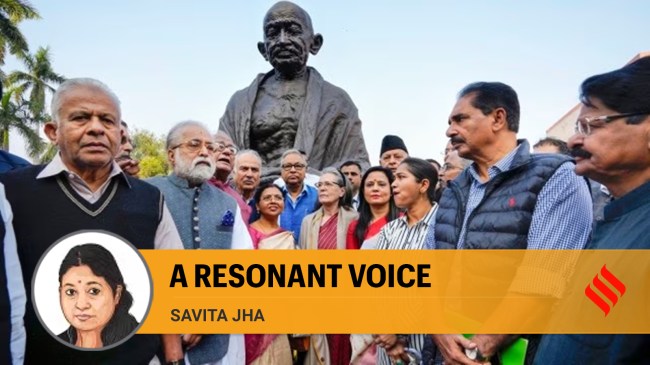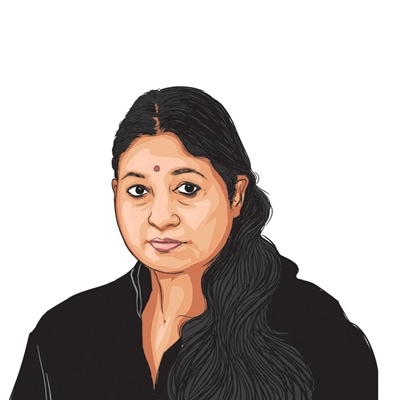Opinion From Mahua Moitra expulsion, a lesson about the political importance of the vernacular
By embracing vernacular idioms and references, she sought to tap into the cultural reservoir that binds communities together, making her political message more relatable and resonant
 TMC leader Mahua Moitra with Congress leader Sonia Gandhi and others at the Gandhi Statue after she was expelled from the Lok Sabha over cash-for-query allegation during the Winter session of Parliament. (PTI)
TMC leader Mahua Moitra with Congress leader Sonia Gandhi and others at the Gandhi Statue after she was expelled from the Lok Sabha over cash-for-query allegation during the Winter session of Parliament. (PTI) Political discourse has often been dominated by English as a symbol of sophistication, education, and power. However, recent events, such as the expulsion of Mahua Moitra from Parliament, have highlighted the importance of engaging with vernacular languages in political communication. Moitra’s expulsion serves as a catalyst for understanding politics through the lens of vernacular languages, challenging the established norms that relegate them to the periphery.
Historically, English has been a language of privilege, inherited from the colonial era, and has served as a marker of social status and education in post-colonial societies like India. The use of English in academia and politics has often reinforced power dynamics, creating a divide between the English-speaking elite and those whose linguistic repertoire is rooted in vernacular languages. This linguistic hierarchy perpetuates the perception that political sophistication and intellectual prowess are intrinsically tied to proficiency in English, marginalising the rich cultural tapestry of vernacular expressions.
Moitra’s expulsion, however, provided a poignant moment that challenged this linguistic hierarchy. Instead of adhering to conventional norms, Moitra strategically employed vernacular expressions, and drew upon Indian cultural imagery to convey her message. This departure from the norm she had adhered to as a public person signalled a shift in political communication, emphasising the need for a more inclusive approach that resonates with a broader spectrum of society. Moitra’s choice to rely on vernacular expressions is a conscious effort to bridge the gap between the political elite and the diverse linguistic landscape of the Indian populace. She not only made her message accessible to a wider audience but also shattered the notion that political discourse must adhere strictly to English conventions to be considered sophisticated.
The significance of Moitra’s approach becomes evident when we delve into the power dynamics inherent in political communication. The use of vernacular idioms and cultural references allows politicians to establish a more intimate connection with their constituents. Language, deeply intertwined with culture, serves as a medium through which individuals express their identity and worldview. By embracing vernacular languages, Moitra sought to tap into the cultural reservoir that binds communities together, making her political message more relatable and resonant.
References from Indian vernacular giants, ranging from Kazi Nazrul Islam to Ramdhari Singh “Dinkar” (jab nash manuj par chhata hai), invocation of popular imageries of Durga, and the use of the metaphor of the vastraharan from the Mahabharata, invoked by a furious Moitra, were not merely linguistic embellishments but deliberate attempts to reclaim cultural identity within the political sphere. In a society where English often overshadows vernacular languages, incorporating such cultural references becomes a form of resistance against the erasure of indigenous narratives. It is a way of asserting that political sophistication need not be divorced from one’s cultural roots; rather, it can be deeply enriched by them as a matter of more effective communication strategy.
Moitra’s strategic use of vernacular expressions also has profound implications for the inclusive character of political discourse. It challenges the elitist notion that proficiency in English is a prerequisite for effective political participation — which is interesting to note as this reliance on English was carefully built and proliferated by Moitra in her public lectures. In a country as diverse as India, where a multitude of languages and dialects coexist, the insistence on English as the primary medium of political expression can exclude a significant portion of the population from actively engaging in the political discourse that shapes their lives.
This incident prompts a broader reflection on the role of academia in perpetuating linguistic hierarchies. The academic emphasis on English as the primary medium of intellectual discourse may inadvertently contribute to the marginalisation and disempowerment of vernacular languages significantly. A more inclusive approach to language in academia would not only empower individuals to express themselves more authentically but also foster a richer and more diverse intellectual environment.
This is not a call for the abandonment of English but a plea for balance and inclusivity. A truly democratic society must recognise and value its linguistic diversity. Academia, as a crucible of ideas and knowledge, has the responsibility to reflect this diversity and provide a platform for voices from all linguistic backgrounds to be heard. Moitra’s expulsion from Parliament and her subsequent use of vernacular expressions in political communication underscore the transformative potential of embracing linguistic diversity. This incident challenges the positioning of English as the exclusive language of political sophistication and intellectual discourse. By recognising the power of vernacular languages to connect, resonate, and reclaim cultural identity, we pave the way for a more inclusive and representative political landscape. It is a call to reevaluate our linguistic priorities, both in politics and academia, and to embrace the rich tapestry of voices that constitute the true essence of a diverse and democratic society.
The writer teaches history at Delhi University






